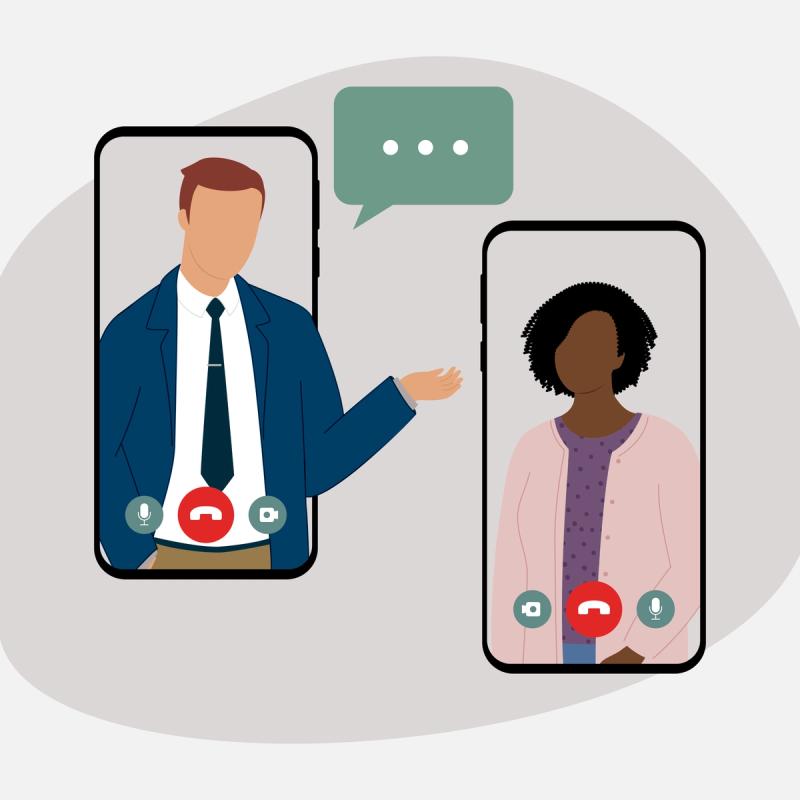The benefits of therapy have been well documented. Talk therapy helps people deal with mental health conditions, cope with major life events and recover from trauma. When it comes to the type of therapy you choose, how do you know what is best for you?
In today’s world, you are fortunate to have options when it comes to therapy. Licensed providers conduct therapy sessions online and in person. Individual therapy and group therapy should also be considered.
Inform your decision with this outline of the benefits, advantages and disadvantages of individual therapy and its alternatives.
Key Takeaways
Individual therapy is a private, one‑on‑one partnership with a licensed mental health provider who helps you set goals and develop coping skills tailored to your needs.
Evidence shows regular sessions can significantly reduce symptoms of anxiety, depression and stress, with many clients noticing progress within the first few visits.
Potential downsides include the temporary discomfort of discussing difficult topics, the cost and time commitment of weekly appointments, and the need to find a good provider match.
Choose a therapist by considering credentials, treatment style, scheduling options (in‑person or virtual), and insurance or self‑pay costs so you can commit to consistent care.
What is individual therapy (counseling)?
Individual therapy is treatment for mental or psychological concerns that occurs in a one-on-one setting between a professional and a patient. The professional tailors the treatment to meet the individual patient’s needs.1

The most prominent types of individual therapy are psychotherapy and talk therapy. They fall within five broad categories:2
Psychoanalysis and psychodynamic therapies. This approach seeks to uncover unconscious meanings and motivations behind problematic behavior, thoughts and feelings.
Behavior therapy. This type of therapy includes subsets of classical conditioning, desensitizing and cognitive-behavioral therapy. This approach focuses on how people learn behaviors.
Cognitive therapy. This approach operates on changing thoughts to change your behavior.
Humanistic therapy. This approach aims to help people use their intuition to make rational choices and reach their maximum potential.3
Integrative or holistic therapy. This is the blend of more than one style of talk therapy. It is common for therapists to use more than one approach to fit the patient’s needs.
How does individual therapy work?
Every therapist and type of therapy will have differences. In general, there are a few things you can expect from individual therapy:4
A therapist’s main goal is to help you better yourself. Expect the focus to be on what you can control and how you can move toward your goals.
Your therapist will help you to look inward at your thoughts, feelings, behaviors and interpersonal relationships. Expect to answer a lot of questions.
Therapy can be uncomfortable. Expect feelings and emotions to come up and remind yourself that your therapist is there to help you.
The average individual therapy session is approximately 50 minutes. Frequency and duration will depend on your needs and your therapist’s treatment plan.5
What are the benefits of individual therapy?
Results from therapy vary widely among individuals, therapists and approaches. However, a few common benefits of individual therapy include:6
Improved emotion and psychological well-being.
Positive changes in the brain and body.
Fewer sick days.
Less disability.
Fewer medical problems.
Increased work satisfaction.
What providers can offer individual therapy?
To practice individual therapy, providers need education and certification of at least a master’s degree. Types of providers that can provide individual talk therapy services include:7
Psychiatrist. A medical doctor (M.D. or D.O.) who specializes in mental health.
Psychologist. A doctorate (Ph.D.) in psychology.
Licensed professional counselor. A master’s degree (L.P.C) with clinical experience.
Marriage and family therapist. A master’s degree (M.F.T.).
Providers can practice in person at an office, online with telehealth or over text.
How effective is individual therapy?
While individual results will vary, approximately 75% of people who enter talk therapy report some benefit from it.8
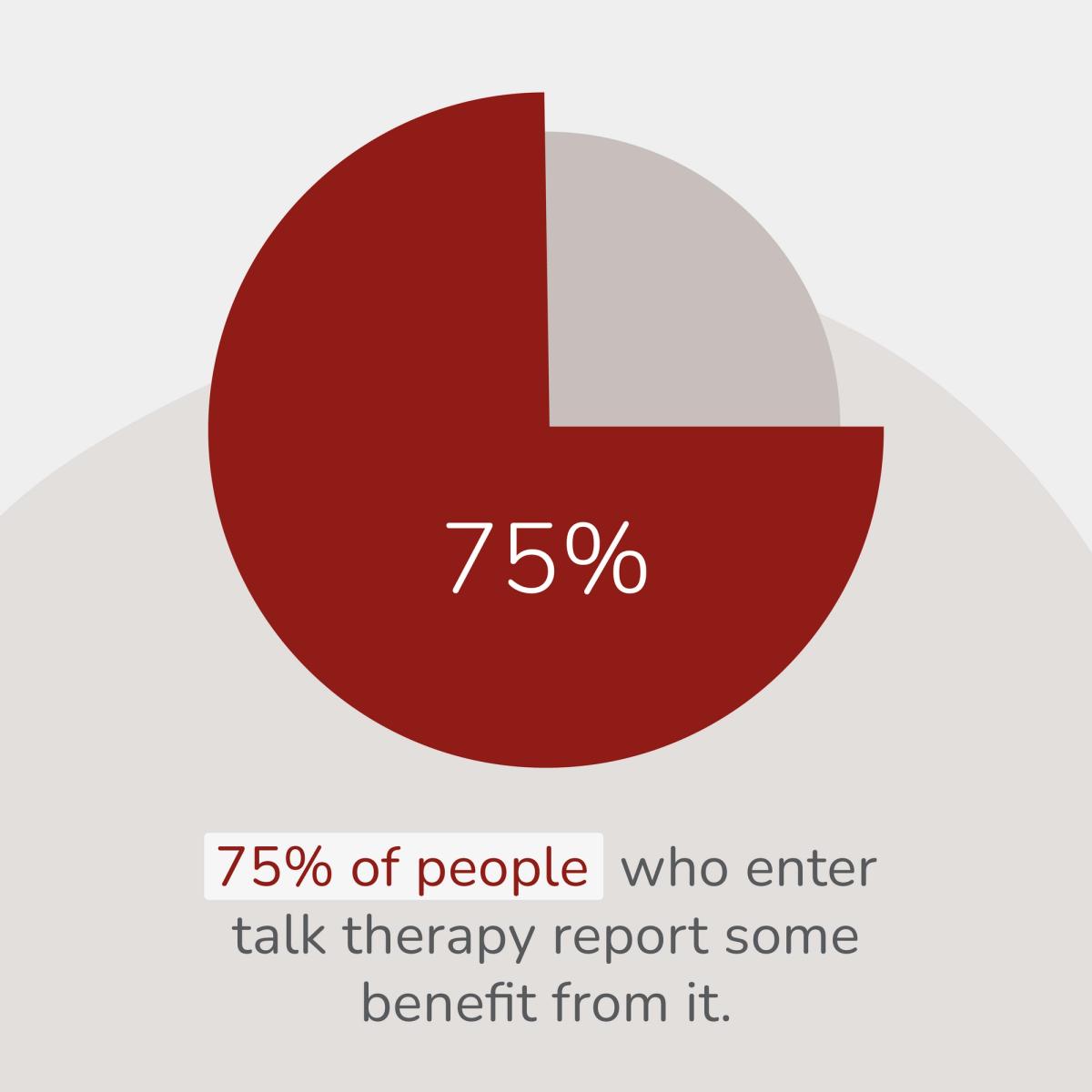
What can individual therapy help with?
Individual therapy can help treat mental health disorders, including:9
Mood disorders, including depression or bipolar disorder.
Substance and addiction disorders.
Eating disorders.
Personality disorders.
Schizophrenia.
You do not have to have a mental health condition to benefit from therapy. It can also help with life improvements, including:10
Resolving conflicts.
Relieve anxiety or stress.
Cope with major life changes.
Learn to manage unhealthy reactions.
Cope with an ongoing or serious health issue.
Recover from physical or sexual abuse.
Cope with sexual problems.
Sleep better.

Affordable, effective individual therapy. No subscription required.
Get access to qualified therapists online when you need it. Take a short assessment and request an online video counseling session when it works for you.
Get StartedHow does individual therapy compare to group therapy?
The main difference is the number of people involved. Individual therapy involves one-on-one therapy with a therapist, while group therapy involves multiple patients at once with at least one therapist. Both individual therapy and group therapy have pros and cons.11
Advantages of individual therapy
Confidentiality. Information shared during a session remains private between the patient and the therapist.
One-on-one attention. Therapy can be more focused and individualized.
Intense and comprehensive level of analysis and treatment.
Customized to the individual.
A strong therapeutic alliance, the working relationship between the individual and therapist.
Flexible scheduling.
Disadvantages of individual therapy
Cost. It’s usually more expensive than group therapy.
No peer interaction. It doesn’t allow individuals to identify with others who share similar issues.
Requires motivation. The patient must be more self-motivated to do the work and apply the therapist’s advice.
Advantages of group therapy
Cost. Group therapy is typically less expensive than individual therapy.
The assurance that individuals aren’t alone. Group therapy is evidence that others struggle with similar issues.
The opportunity to receive and give support.
The development of communication and socialization skills. Individuals learn how to express themselves and accept criticism.
Encourages self-awareness by listening to others with similar experiences.
A safe space to discuss vulnerable feelings and emotions with a group.
Exposure to successful behaviors of other individuals who have gone through similar experiences. Participants can model their behavior after others.
Disadvantages of group therapy
Less focused attention from the therapist.
Less confidentiality. Group therapy is meant to be private. However, there are more people to break the rules potentially.
It is easier to hide in a group. Unmotivated individuals may avoid accountability because there is less attention on them.
Less flexibility. Groups typically meet at specific times.
Certain personalities may struggle in group therapy, including individuals who are shy, antisocial, passive-aggressive or have social anxiety.
How does online individual therapy compare to in-person individual therapy?
Both individual therapy and in-person therapy and been shown to be effective at treating mental health disorders. Research shows no significant differences between the two.12
When comparing online individual therapy to in-person individual therapy, it is more about preferences and lifestyle.
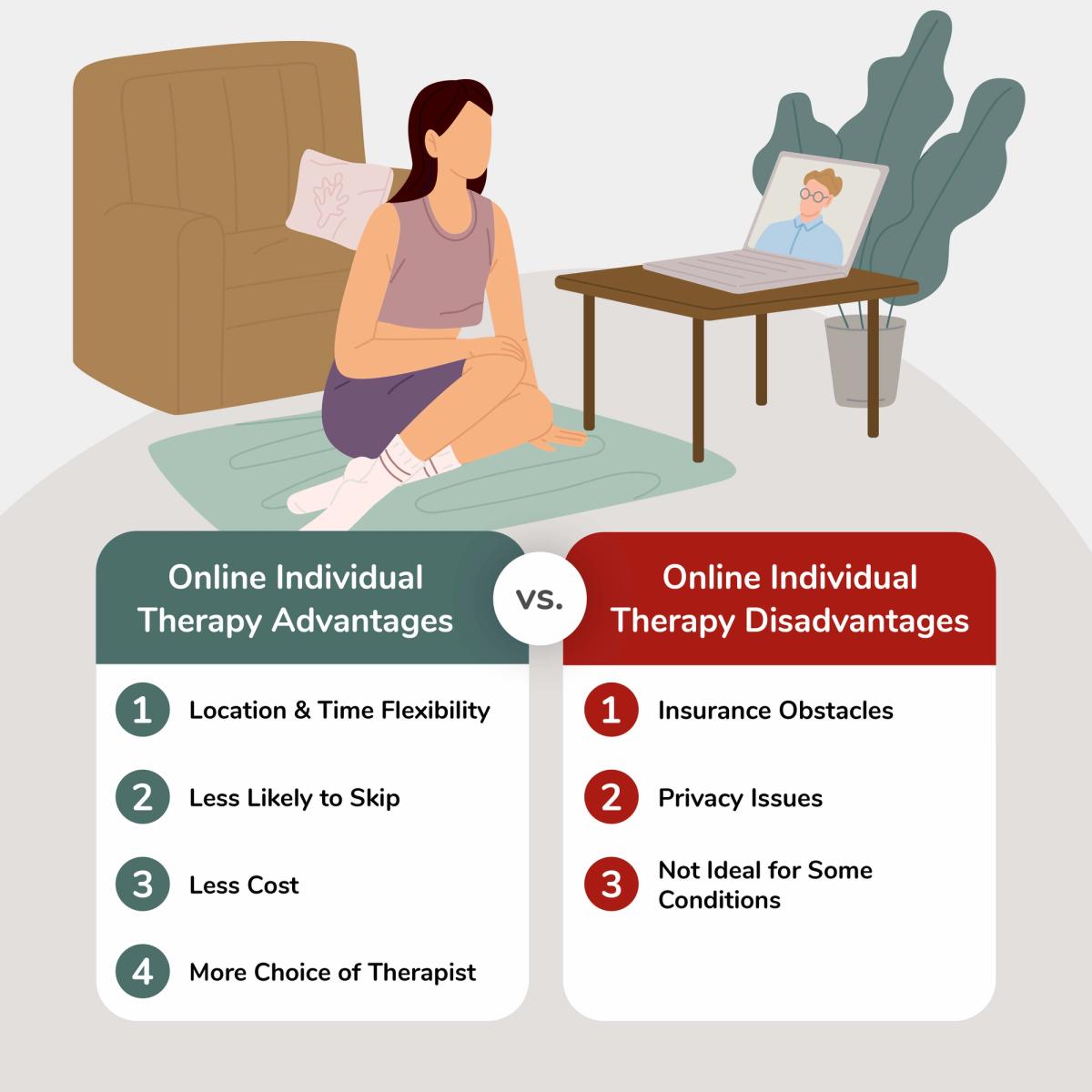
Advantages of online individual therapy
Location flexibility. Access to appointments anywhere with an internet connection and to providers outside your geographic area.
Time flexibility. Online therapy often offers more appointment options, and there is no travel time to consider.
Less likely to skip. In one study, researchers found that participants in online therapy were less likely to miss an appointment than those doing in-person therapy.13
Less cost. Online therapy is often less expensive than in-person therapy. There are no additional costs, such as travel, time off work or childcare.14
More choice of therapist. Online, there is more access to therapists specializing in your needs. It’s also easier to switch online therapists if it’s not a good fit.
Disadvantages of online individual therapy
Insurance obstacles. Although many online providers accept insurance, some don’t and some insurance does not cover online therapy.
Privacy issues. Others could overhear if the patient doesn’t have a private area to conduct the session.
Not ideal for some conditions. More serious mental health conditions may require in-person interaction.15
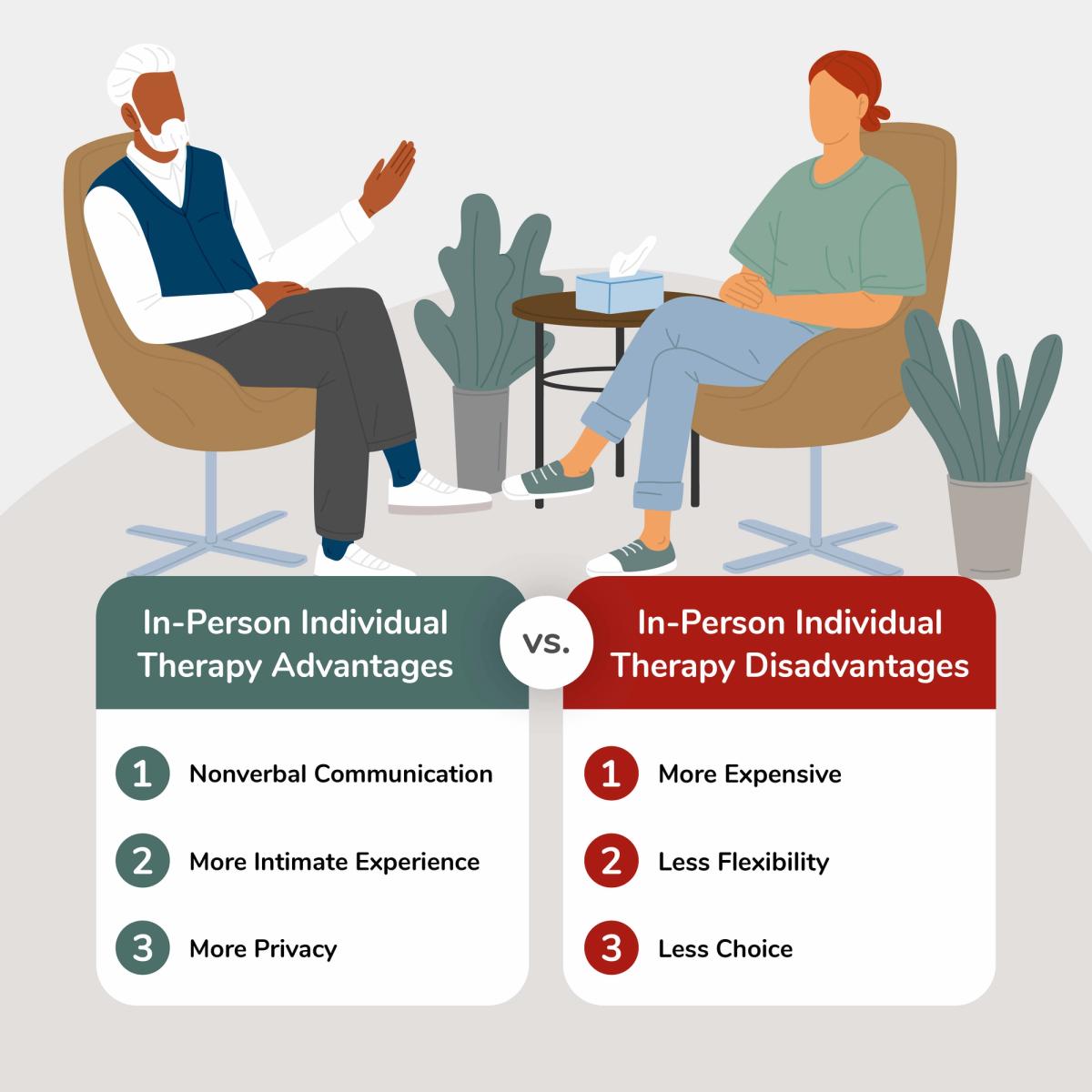
Advantages of in-person individual therapy
Nonverbal communication. Therapists can gather nonverbal information from the patient more easily with an in-person appointment.
More intimate experience. In-person therapy sessions allow the participants to feel each other’s emotions and create deeper connections.
More privacy. An in-person therapist has a dedicated, private space to have conversations.16
Disadvantages of in-person individual therapy
More expensive. Even if the cost of the therapy is the same, there are additional costs of travel, time off work, childcare and more.
Less flexibility. In-person appointments have limitations regarding location. Patients in rural areas or without transportation will have challenges getting to an in-person appointment.
Less choice. Finding an in-person therapist is limited by location, insurance and other factors.
How RedBox Rx can help
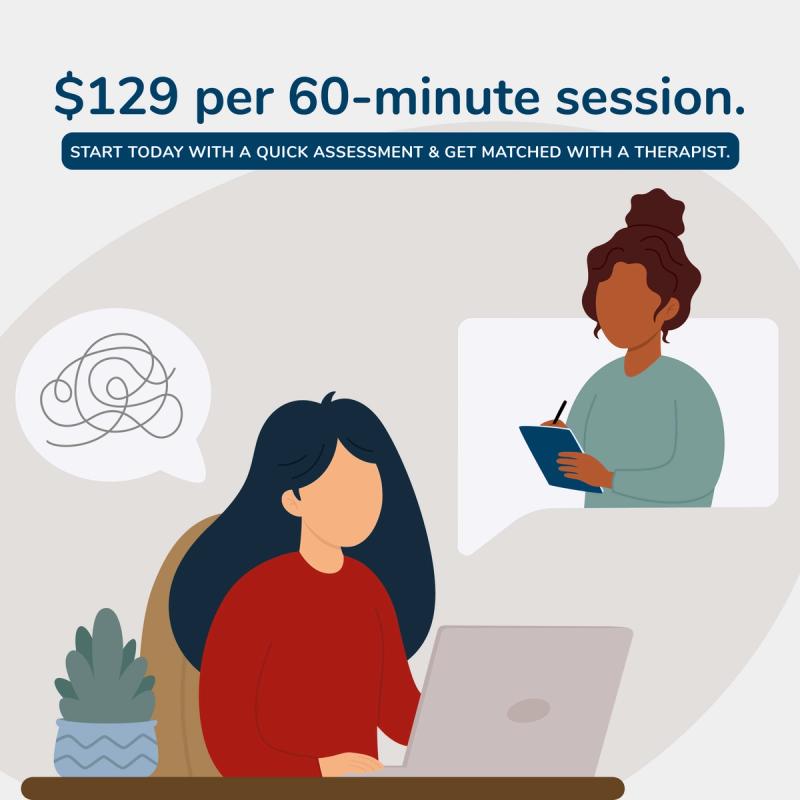
RedBox Rx makes online individual therapy easy and affordable.
Benefits of RedBox Rx online talk therapy:
Pay-as-you-go therapy sessions.
$129 per 60-minute session.
Individual therapy for those 18 years or older.
Secure, private, HIPAA compliant.
HSA and FSA eligible.
Start today with a quick assessment and schedule a video appointment with one of our licensed providers.

